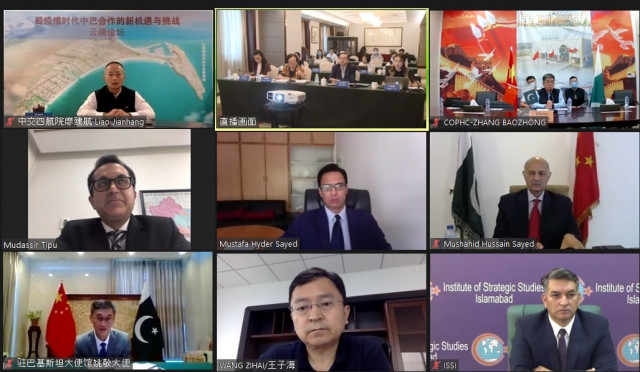PCI hosts webinar to discuss China-Pakistan cooperation post-epidemic era
Govt officials, leading experts, and entrepreneurs discuss post-pandemic Pak China relationship

Pakistan-China Institute (PCI) on Thursday co-hosted a joint China-Pakistan think tanks webinar on ‘New Opportunities and Challenges of China-Pakistan Cooperation in the Post-Epidemic Era’.
The webinar brought together government officials, leading experts, and entrepreneurs to discuss the post-pandemic relationship between Pakistan and China.
Chinese Ambassador Yao Jing was among the two keynote speakers, the other being Senator Mushahid Hussain Sayed.
Former population minister and head of Research & Development International (RDI), Dr Baige Zhao, in her opening remarks said that President Xi Jinping’s speech about improving connectivity through the Belt and Road Initiative (BRI) at last month’s high-level video conference shows the will of China to start a new era of globalisation.
“BRI will play a key role in promoting peace and stability,” Zhao said.
Ambassador Yao Jing said that he has been personally witnessing the cooperation between two countries since the start of the outbreak. Pakistan’s assistance to China in February, when China was facing Covid-19 crisis and President Alvi’s visit to China expressed the solidarity of Pakistan to China.
“Pakistan is the first country with whom China is sharing vaccine development research information,” Ambassador Jiing said.
While talking about China-Pakistan Economic Corridor (CPEC), he said that 13,000 Chinese technicians, engineers and experts are working on various CPEC projects, along with over 60,000 Pakistani nationals.
He also mentioned the Chinese assistance to Pakistan in the wake of the pandemic, which is worth $15m.
“He said that so far 10 chartered flights from China brought experts & equipment during Covid-19 and upon the request of the Pakistan government,” he said. “1000 more ventilators will be given to Pakistan by the end of this month.”
Senator Mushahid Hussain, Chairman of PCI and the Senate Foreign Relations said that coronavirus knows no borders. “This crisis has strengthened our bilateral bond as both Pakistan and China support each other’s core interests. It is a common enemy of mankind and a common challenge to fight with. China has done a remarkable job in containing the virus by taking timely and efficient measures.”
He also appreciated China’s support to Pakistan in these difficult times. While talking about opportunities arising from the pandemic, he said that the time has come to reset our priorities, focusing on human security, human development, better hospital care and climate change.
In this regard, BRI initiative can be taken as a guiding tool to reach goals of a shared future.
“The balance of power is shifting towards East from the west,” Senator Hussain said. “The Asian countries have contained Covid-19 more effectively than west.”
He also talked about the three resolutions passed by the Parliament with regards to regards to China.
The first one on February 12 to express solidarity with China in wake of Covid-19; the second one in May to thank China for assistance to Pakistan during the pandemic and the third one in June to support China on the diplomatic front after tensions in India-China relationship.
PCI Executive Director Mustafa Hyder Sayed said that two events are important to be mentioned in today's webinar.
“One is the policy statement issued by President Xi Jinping’s speech during his speech at the World Health Assembly on May 18 and the second one is the high-level video conference BRI in June,” PCI ED said.
There are some similarities in the key points that emerged from these events. Both talked about following a people-centred approach in devising the policies and China’s commitment to supporting debt relief given by the G-20 to the developing countries, he added.
Moreover, these events highlighted the need for strengthening international cooperation and developing global health governance and developing coronavirus vaccines.
While talking about the opportunities arising from the crisis, he said that the government should focus on surgical goods, sports goods and medical equipment as Pakistan has the capacity to make the best surgical goods in the world.
China can help Pakistan in this regard, he said. Moreover, he termed the recent shift in Iran’s policy in regards to CPEC a good omen for regional connectivity.
He also talked about the need for developing the skills of labour working on Special Economic Zones (SEZs) and the role that the private sector should play in the development of BRI.
He added that China’s experience in developing SEZs can help Pakistan SEZs to succeed.
Head of COPHC, Zhang Baozhong, said no Pakistani employee in any CPEC project has lost their job during coronavirus and neither has any seen any cut in salary whereas all CPEC projects are free of Covid-19.
Director-General Foreign Office ,Mudassir Tipu, heading the China Desk, gave a rundown of Government policies on Pakistan ties with China.
Other participants of Joint Pakistan-China webinar were Director-General of China Center for Contemporary World Studies of the International Department of the CCCPC Xin Jin, Executive Vice President of Fudan Institute of Belt and Road & Global Governance (BRGG) ,Renwei HUANG, Deputy Director-General of National Institute of International Strategy, Hailin YE, Director, Asia Study Center, SDPI, Shakeel Ahmad Ramay, Chairman of Wuhan Landing Medical HI-TECH, Xiaorong Sun, Deputy General manager of CCCC-FHDI Engineering Jianhang Liao, President of JW SEZ Group,Shah Faisal,Director, China-Pakistan Study Centre, ISSITallat Shabbir and Executive Director of Center of Excellence- CPEC, Liaqat Ali Shah.



















COMMENTS
Comments are moderated and generally will be posted if they are on-topic and not abusive.
For more information, please see our Comments FAQ